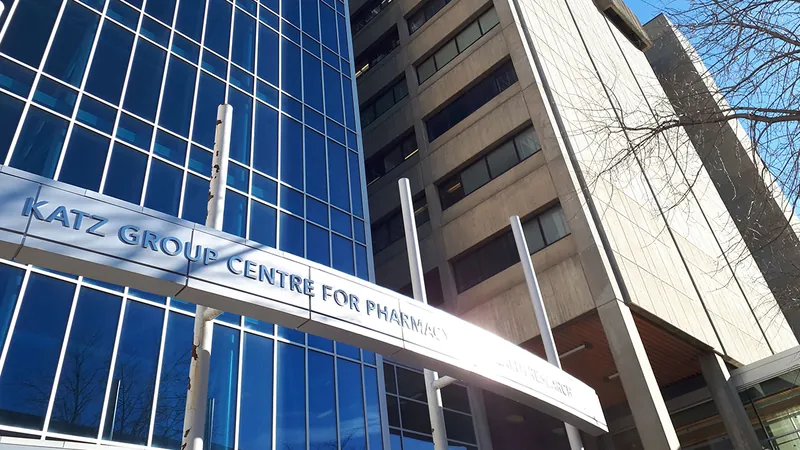
Groundbreaking Study Reveals Heart Health Benefits of Anti-Obesity Drug GDF15
2024-11-20
Author: Michael
Exciting Developments at the University of Alberta
In an exciting new development from the University of Alberta, researchers are uncovering the remarkable potential of GDF15, an anti-obesity drug currently in human clinical trials, to enhance heart function. Surprisingly, the positive effects on cardiac health observed in obese mice treated with GDF15 go beyond the expected improvements linked to weight loss alone.
Research Leadership and Study Design
Led by John Ussher, a revered professor in the faculty of pharmacy and pharmaceutical sciences, and a Canada Research Chair specializing in the pharmacotherapy of energy metabolism in obesity, this study seeks to unravel the connections between weight management and heart health. Ussher's team conducted experiments on two groups of obese mice, both suffering from Type 2 diabetes. One group received GDF15, while the other followed a controlled diet to achieve weight loss.
Findings on Heart Function
Despite both groups experiencing similar reductions in weight, the results revealed that the GDF15-treated mice exhibited significantly greater improvements in diastolic heart function. "We made sure that the weight loss was equivalent in the two groups, and yet the enhancement in heart function was notably better in those treated with GDF15," Ussher stated.
Diastolic Dysfunction and Risks
Diastolic dysfunction—a condition where the heart struggles to relax between beats—can lead to severe complications, including diastolic heart failure. This dysfunction occurs due to the stiffness of the heart's left ventricle, making it difficult for the heart to fill with blood properly. Ussher emphasizes the importance of how the heart relaxes post-pumping in sustaining overall cardiovascular health.
Diabetes and Heart Disease
Alarmingly, individuals with diabetes are more than twice as likely to develop heart disease compared to their non-diabetic counterparts. For Type 2 diabetes patients, heart disease remains the leading cause of mortality, often exacerbated by the often silent progression of diastolic dysfunction. Ussher notes that numerous diabetes patients may go undiagnosed for years, as conventional healthcare typically focuses on managing blood sugar levels rather than cardiac evaluations.
Importance of Early Diagnosis
"Many patients don’t receive a cardiac check-up until they’ve had diabetes for a decade or two," Ussher reveals. Even when symptoms manifest, such as fatigue and shortness of breath, they may be misattributed to other factors, which contributes to the delay in diagnosis. By the time patients are diagnosed with diastolic heart failure, their condition may have significantly deteriorated.
The Impact of Diastolic Dysfunction
Ussher provides a stark comparison: "A diabetic patient with diastolic dysfunction could comfortably walk up a flight of stairs at 45. Yet, by 65, with diastolic heart failure, that same patient could find even those stairs daunting." With nearly half of all heart failure cases involving diastolic issues, this poses a significant challenge for both the aging population and healthcare systems worldwide.
Future Directions and Preventative Care
This research raises critical questions about preventative care. Ussher is keen to investigate whether early identification of diastolic dysfunction in younger, obese Type 2 diabetes patients could help mitigate the risk of heart failure in later life. Could treatments like GDF15 lead to important preventative strategies that significantly decrease the burden of heart disease among the elderly suffering from diabetes?
Concluding Thoughts
With the ongoing quest to understand the implications of these findings, the potential of GDF15 could resonate far beyond the lab and into the hearts of millions struggling with obesity and diabetes—bringing hope for a healthier future. Stay tuned as we follow this groundbreaking research!









 Brasil (PT)
Brasil (PT)
 Canada (EN)
Canada (EN)
 Chile (ES)
Chile (ES)
 España (ES)
España (ES)
 France (FR)
France (FR)
 Hong Kong (EN)
Hong Kong (EN)
 Italia (IT)
Italia (IT)
 日本 (JA)
日本 (JA)
 Magyarország (HU)
Magyarország (HU)
 Norge (NO)
Norge (NO)
 Polska (PL)
Polska (PL)
 Schweiz (DE)
Schweiz (DE)
 Singapore (EN)
Singapore (EN)
 Sverige (SV)
Sverige (SV)
 Suomi (FI)
Suomi (FI)
 Türkiye (TR)
Türkiye (TR)